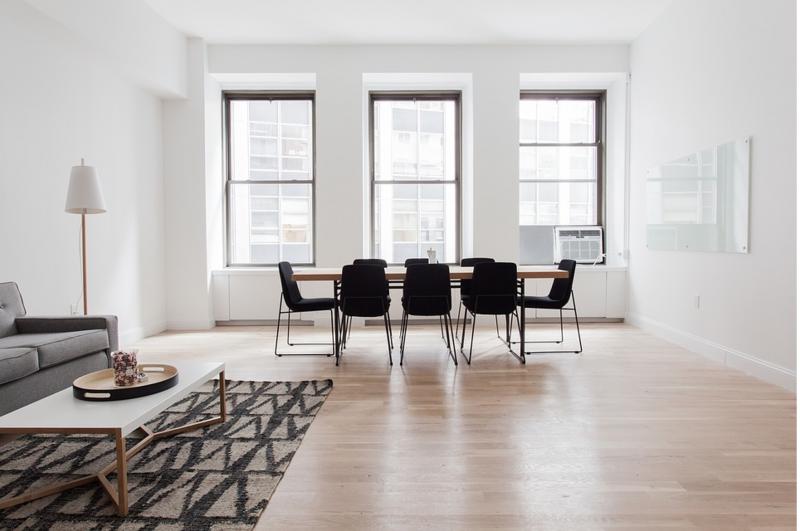The Pros and Cons of an Open Concept Home

The open floor plan is a popular architectural feature for interior design, which combines the living room, kitchen, and dining room into a single large "great room." Both the open floor plan and the closed floor plan — where each of these rooms is its own individual space — have their own advantages and disadvantages. Since the open concept is so popular among homeowners, buyers, and renters, we will take a look at the pros and cons of having an open concept home.
Pro: Improves Traffic Flow
In a closed concept home, you have a lot of doors and dividers and probably some hallways to navigate through. If you have kids or pets, navigating a closed-concept home can be frustrating sometimes. A large household with multiple busy schedules will love an open concept home because there is much more space for everyone to move around. If you tend to have large gatherings at your home, you will also enjoy the open concept because it lets your guests mingle more comfortably.
Con: It Might Feel Too Big
The open concept home might feel too big if you have a large house with plenty of square footage. Some people are attracted to the warm and cozy home, but that feeling can be hard to achieve in a room with no walls. You might feel like you are in a large, echoey warehouse sometimes.
Pro: Better Lighting
Since there are no walls or partitions in the open concept home, natural light can flow through the space more easily. Lighting can also make the space seem bigger if you have smaller square footage.
Con: Expensive Heating and Cooling Costs
A large space takes a lot more energy to keep it warm or cool, depending on the time of year. The spaciousness of the open concept home can be especially difficult to keep warmer or cooler because there is so much space. As a result, you are looking at some expensive energy bills in an open concept home, which is one of the biggest cons of an open concept home.
Pro: Easier Communication
Keeping an eye on the kids or the dog while cooking dinner is easier said than done in a closed concept home. Calling to someone in the living room from the kitchen can also be tricky; they may not be able to hear you depending on how well insulated your walls are. The open concept home is the perfect solution to this. Without walls, you can keep a much better eye on the kids and pets from the kitchen, and people are much more likely to hear you calling them without walls getting in the way. Sound travels much better, and you have a better sense of togetherness with your household.
Con: Noisy
While some homeowners might find sounds being able to travel easier between rooms a good thing, others might find it frustrating. Without walls, noise travels much easier, and you might get frustrated having a conversation in one area to float into another and disrupt you. As a result, there can be less peace and quiet, and you may find yourself lacking privacy. This con became especially prevalent at the beginning of the COVID-19 pandemic when families were suddenly all at home. For example, a parent had trouble working from home with their children in another part of the room.
Pro: Flexible Multifunctional Space
It is easy to make an open concept home into a flexible, multifunctional space. You can move things around pretty easily when entertaining, working on a large craft project, or needing to adjust space for another reason.
Con: Smells Travel
While the idea of smelling fresh cookies in the oven from the couch is ideal to many people, those are not the only smells that will travel. If you burn something in the kitchen, it will stink up the entire area, and with a large, open space, it will be much harder to air out. If you are cooking something with strong scents, the smell will get everywhere.
Pro: Small Spaces Feel Bigger
When you live in a smaller closed concept home, walls can make the space feel even smaller. However, when you have an open concept home, even if you have smaller square footage, you will be able to arrange your furniture and lighting to make the space seem bigger.
Con: Can Require Extra Upkeep
It is easier to ignore dishes in the sink for a day or two in a closed concept home or ignore the Lego mess your child left in the dining room. However, in an open concept home, those dirty dishes are not out of sight; the Legos are right out in the open. Therefore, you will need to be much more diligent about keeping your home clean so that clutter does not make the space messy.
The kitchen is usually the messiest part of any home because of how many dishes cooking, and eating creates. Unless you clean as you go, your messy kitchen is always going to be on display, bugging you.
Depending on your layout, even a small amount of clutter can make the room messy. Containing the mess is a thing of the past when you have an open concept.
Pro: Eliminate Underused Spaces
Do you really need a formal dining room that you will only use on a few holidays a year? Those spaces are seldom used, and they can take up a lot of space that could be much better used. With an open concept home, you will not have space wasted with a formal dining room. If your current home has an underused space like this, you can look into knocking down the wall to open the space up and make use of an otherwise seldom used room.
Con: Construction Costs of Knocking Down Walls
If you are thinking about knocking down a wall to make your home an open concept space, the construction costs might get in the way of your plans. Construction, in general, can be costly, but if the wall you want to knock down is a load-bearing wall, you can be looking at thousands of dollars in construction costs to compensate for removing that wall and redistributing the weight of the home.
Final Thoughts
We hope this helps you with your home shopping. When buying a home, there are many things to research, from shopping for a mortgage lender to finding the perfect house for your budget. Keep in mind that while an open concept home might seem great now, that might not be the case in a few years, and it is tricky to divide up the space of an open concept home to give it a more closed feeling.
About the Author

Auz Burger is a freelance writer who specializes in real estate. She has a BA from Washington State University and has been writing and editing professionally for over a decade.
More to Read:
Previous Posts:








